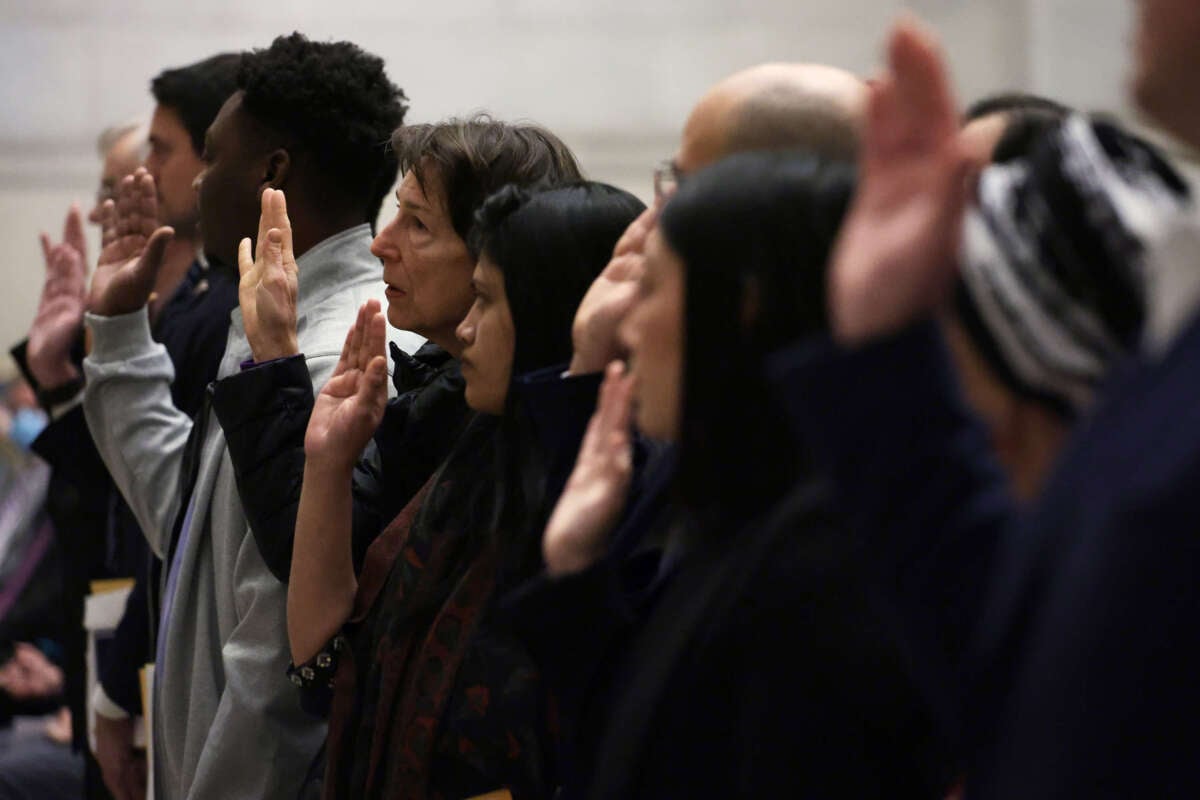Requests from immigrants to obtain U.S. citizenship status are being processed at the fastest rate seen in over a decade, according to a new report.
The fast clip of people receiving citizenship status could play a role in the outcome of the 2024 presidential contest, although it’s not clear yet which states these new citizens are living in or whom they intend to vote for. Immigrants who become citizens are allowed to take part in voting in elections, without any delay to that right once they receive that status.
A previous backlog of requests for citizenship applications was created in part due to the COVID-19 pandemic, but also in large part because of the anti-immigration policies that were enacted under former President Donald Trump. Under that administration’s rules, immigration officials conducted lengthier reviews of applicants, resulting in a doubling of the amount of time it typically took to process them. Federal agencies were also struggling with funding issues, which also led to a delay for many green card-holding residents seeking citizenship status.
The number of applications from immigrants to become citizens in the U.S. typically grow when the four-year presidential election cycle comes closer, no matter who is running in those elections. But under Trump’s directives, it’s estimated that a potential 300,000 prospective citizens were prevented from being able to vote in 2020 due to the backlogs that were created.
Those delays are now being cut in significant ways. According to the report from The New York Times, the wait is now at around five months, halving what was seen under the Trump administration.
That reduction is due in large part to actions taken by President Joe Biden. Upon assuming office in 2021, Biden issued an executive order that rescinded many of the orders Trump had made, and specifically called for agencies to “substantially reduce current naturalization processing times.”
As a result, around 3.3 million immigrants who have lived in the U.S. for years received their citizenship status under the current administration.
Trump has long expressed xenophobic, anti-immigration stances, the most notorious of which gained attention when he announced his run for the presidency in 2015. Trump wrongly described immigrants in that speech at Trump Tower as rapists, drug traffickers and criminals, adding the caveat that “some, I assume, are good people.”
In fact, statistical analyses have consistently shown that immigrants are less likely to commit crimes than U.S.-born citizens.
Ostensibly, Trump has tried to temper his opinions on immigration in public speeches, saying at the State of the Union in 2019, for example, that he supported expanding the number of immigrants entering the country to become citizens. The huge backlog and slowdown of citizenship applications under Trump’s watch, however — not to mention, his derision for asylum seekers coming to the U.S. in a completely legal fashion — demonstrated that Trump’s statements were not true.
Despite the increase in the rate of citizenship applications under Biden, the process to get that status is still an arduous and lengthy one, which inherently favors white applicants over nonwhite and Hispanic applicants, as well as treating LGBTQ applicants more strictly than cisgender heterosexual people seeking citizenship status. High application fees — up to $725 — can also encumber immigrants with limited financial means from choosing to apply.
Other hurdles that exist in the process can make it incredibly difficult in additional ways. Immigrants with green cards living in the U.S. must live in the country for five years (or three years if they are married to a citizen), and cannot take extensive trips out of the country during that time. They are required to speak English, with some exceptions given to older residents or those with disabilities, and must answer “yes” to an ambiguous question on the application regarding whether they are a “person of good moral character” — a standard that can result in denial of applications, even for individuals already married to U.S. citizens, based on the conservative ideals of low-level bureaucrats, as per a recent Supreme Court ruling.
Applicants for citizenship must also pass a “citizenship test” that includes U.S. historical and political trivia. Studies have demonstrated that these tests confound most Americans who were born in the United States, leading to criticism about their effectiveness in determining who should become a citizen and who should not.
Angry, shocked, overwhelmed? Take action: Support independent media.
We’ve borne witness to a chaotic first few months in Trump’s presidency.
Over the last months, each executive order has delivered shock and bewilderment — a core part of a strategy to make the right-wing turn feel inevitable and overwhelming. But, as organizer Sandra Avalos implored us to remember in Truthout last November, “Together, we are more powerful than Trump.”
Indeed, the Trump administration is pushing through executive orders, but — as we’ve reported at Truthout — many are in legal limbo and face court challenges from unions and civil rights groups. Efforts to quash anti-racist teaching and DEI programs are stalled by education faculty, staff, and students refusing to comply. And communities across the country are coming together to raise the alarm on ICE raids, inform neighbors of their civil rights, and protect each other in moving shows of solidarity.
It will be a long fight ahead. And as nonprofit movement media, Truthout plans to be there documenting and uplifting resistance.
As we undertake this life-sustaining work, we appeal for your support. We have 8 days left in our fundraiser: Please, if you find value in what we do, join our community of sustainers by making a monthly or one-time gift.
